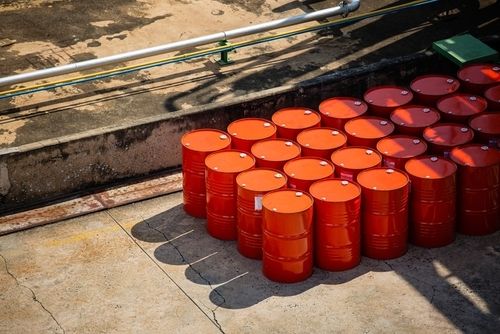Oil Prices Steady Ahead of U.S. Tariffs Impact on India

Oil steady as US imposes 25% tariff raising Indian export duties to 50%.
India resumes Russian crude buys despite US tariffs; future purchases depend on economics.
Ukraine strikes cut Russian refining; Russia boosts exports by 200,000 bpd in August.
Oil Prices Steady Amid U.S. Tariff Pressure on India
Oil prices remained mostly unchanged on Wednesday following a sharp decline in the previous session, as markets awaited the imposition of hefty U.S. tariffs on India, the world’s third-largest crude importer. These tariffs are being introduced in response to India’s continued purchases of Russian oil. The additional U.S. duties of 25%, effective from 12:01 a.m. EDT (04:01 GMT) Wednesday, will raise overall tariffs on Indian exports to 50%—among the steepest penalties imposed by Washington.
U.S. Tariffs Target Indian Russian Oil Purchases
The U.S. administration, led by President Donald Trump, attributes the higher duties to India's increased Russian crude imports, which surged after Russia’s invasion of Ukraine prompted Western sanctions that discounted Russian supply. Following these announcements and the EU's enhanced sanctions on Nayara Energy, Indian refiners initially cut back on buying Russian crude.
However, according to company sources, Indian Oil and Bharat Petroleum, both state-owned refiners, have resumed purchasing Russian crude for September and October shipments. Indian Oil, the country's largest refiner, stated its future purchases will depend on economic considerations. This has prompted analysts to question the effectiveness of the tariff increase. Warren Patterson, ING's head of commodity strategy, noted, "The secondary tariff has not been enough to stop India from buying Russian oil," underscoring the market’s close attention to future Russian oil shipments to India.
Ukraine Conflict Disrupts Russian Oil Exports
Beyond tariffs, the war in Ukraine continues to affect oil dynamics, with Ukrainian drone strikes targeting Russian refineries, reducing their refining capacity. As a result, Russia has been forced to increase crude oil exports from its western ports by 200,000 barrels per day in August compared to earlier plans, according to three sources familiar with the issue. This adjustment compensates for processing disruptions caused by the attacks last week.
Brent crude futures edged up by 2 cents to$67.24 per barrel at 01:33GMT, while West Texas Intermediate(WTI) futures held steady at $63.25. Both benchmarks had dropped over 2% on Tuesday after climbing to two-week highs earlier in the week. Daniel Hynes, senior commodity strategist at ANZ, highlighted investor nerves, saying, "Additional tariffs on India in response to its purchases of Russian crude hang over the market."
* The content presented above, whether from a third party or not, is considered as general advice only. This article should not be construed as containing investment advice, investment recommendations, an offer of or solicitation for any transactions in financial instruments.



